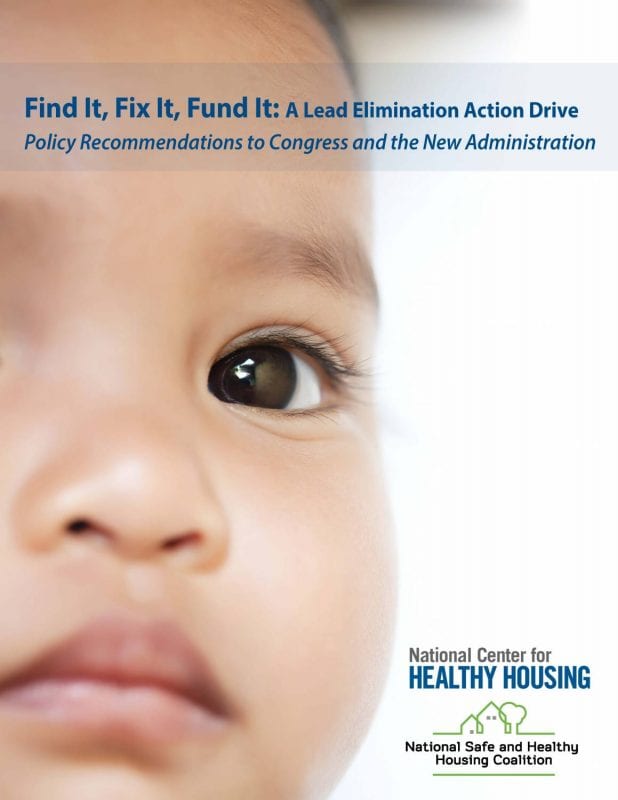Introducing Find It, Fix It, Fund It
In the wake of the Flint lead water crisis and increased national will to address the problem, NCHH and the National Safe and Healthy Housing Coalition have launched a bold new drive to eliminate lead poisoning. It’s simple yet comprehensive: Find lead hazards, eliminate them, and build the political will to create key public investments and policies to do so.
Find It, Fix It, Fund It has grown to include over 150 members. See who’s joined the drive so far.

Find It, Fix It, Fund It: A Lead Elimination Action Drive: Policy Recommendations to Congress and the New Administration
NCHH and the National Safe and Healthy Housing Coalition are leading initiatives to eliminate lead paint hazards and dramatically increase lead poisoning surveillance and home-based follow-up services and will support allies and partners in eliminating lead hazards in water and other sources.
Materials
Over 50 recommendations for Congress and the Administration, written by Find It, Fix It, Fund It members and released in February 2017.
Talking points to accompany the recommendations.
A declaration supporting the Find It, Fix It, Fund It principles signed by over 300 attendees at the Lead and Healthy Housing Conference in Albuquerque, New Mexico, on May 5, 2016.
Get Involved
- To join Find It, Fix It, Fund It: A Lead Elimination Action Drive.
- To add your organization’s logo to the drive.
Find It, Fix It, Fund It National Roundtable
Co-chaired by David Jacobs (NCHH)
The National Roundtable develops policy goals, carries out administrative and legislative advocacy, and serves as an organizing force for Find It, Fix It, Fund It actions. The National Roundtable has open membership and meets on the first Wednesday of every month. Join here.
The National Roundtable meets on an ad-hoc basis.
For more information on the National Roundtable or Find It, Fix It, Fund It, please contact Sarah Goodwin.
Guiding Principles for NCHH’s Lead Advocacy
The National Center for Healthy Housing’s core principle for lead advocacy is to promote primary prevention, leading to the elimination of exposures and thus the elimination of childhood lead poisoning. Until we achieve that goal, we will also continue to press for urgently needed follow-up services for children impacted by lead.
Preventing exposure to lead-based paint, dust, and soil hazards requires robust support of all three legs of the stool for successful government action: the CDC to monitor children’s blood lead levels, HUD to control lead hazards, and EPA to set standards based on the most updated science.
NCHH’s Role in Lead Advocacy
NCHH leads the national effort to:
- Dramatically increase funding to CDC’s Healthy Homes and Lead Poisoning Prevention Program, to provide needed surveillance, outreach, education, and follow-up services nationwide, ensuring blood lead level surveillance in all 50 states.
- Dramatically increase funding to HUD’s Office of Lead Hazard Control and Healthy Homes to ensure that lead hazards are identified and controlled in pre-1978 low-income homes with children younger than six years old.
- Promote financing for home-based lead follow-up services.
- Expand lead-based risk assessments to all HUD inspection protocols.
- Re-establish a national lead poisoning advisory committee and update national plans for eliminating lead paint hazards and providing healthy homes.
NCHH plays a major role in efforts to:
- Update federal lead paint, dust, and soil regulations using the most recent science.
- Promote lead poisoning research.
NCHH supports efforts to:
- Identify and replace lead pipes and identify and eliminate other sources of lead exposure.
- Identify and fully fund needed follow-up services to children impacted by lead.
- Increase private resources for lead paint hazard control, including grants, tax credits, incentives, settlements, and enhanced disclosure.
Recent Actions
Appropriations
- Led the national effort to secure passage of $25 million in new lead hazard control funding by the full Senate appropriations committee, April 21, 2016.
- Issued the “Call for 230” in February 2016 to more than double lead hazard control and healthy homes funding to HUD to $230 million – picked up by 20 senators, hundreds of organizations, and most recently, the Muppets, on Last Week Tonight with John Oliver (caution: strong language).
- Also in February 2016, issued the call to more than double funding for children’s blood lead level surveillance in order to extend it to all 50 states – since picked up by over 100 members of Congress.
Administrative Advocacy
- Led advocacy for HUD to protect the health of residents of its largest program, Section 8 vouchers, resulting in the current upgrade of its housing quality standards.
- In 2016, renewed the call for re-establishment of CDC’s groundbreaking scientific lead poisoning advisory committee – now picked up by 75 U.S. representatives.
Legislative Advocacy
- Provided technical and scientific advice to members of Congress on six lead poisoning prevention bills introduced in 2016 alone.
- Recognized by Senator Jack Reed in April 2016 for efforts leading to introduction of his Title X Amendments Act improving protections of low-income children, including those living in studio and efficiency apartments. These provisions were included in bipartisan appropriations legislation passed unanimously out of committee on April 21.
National Safe and Healthy Housing Coalition Advocacy
- Coalition members initiated our “Call for 230” to double lead poisoning prevention funding on February 10, 2016, by meeting with 80 of their representatives and senators.
- Congressman Kildee of Flint and Director Breysse of CDC’s National Center for Environmental Health joined Coalition members April 12, 2016, to discuss new directions in the fight to end lead poisoning in the wake of Flint.
Media Advocacy
- 04/17/2016 | John Oliver Supports “Call for 230” Million for HUD’s Office of Lead Hazard Control
[url; YouTube] - 03/04/2016 | NCHH’s David Jacobs Discusses Need for Increased Funding in New York Times
[url; The New York Times]